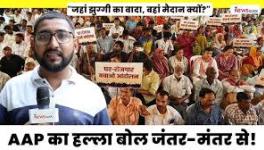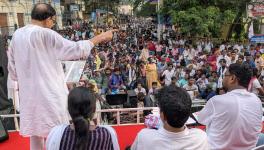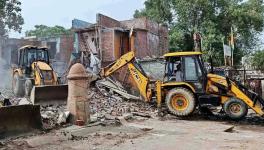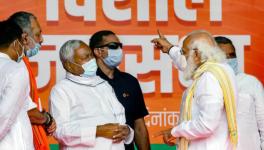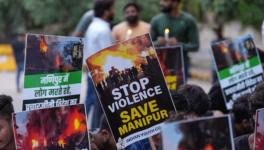Power Employees In Uttar Pradesh Oppose BJP’s Move To Privatise Karchana Power Plant
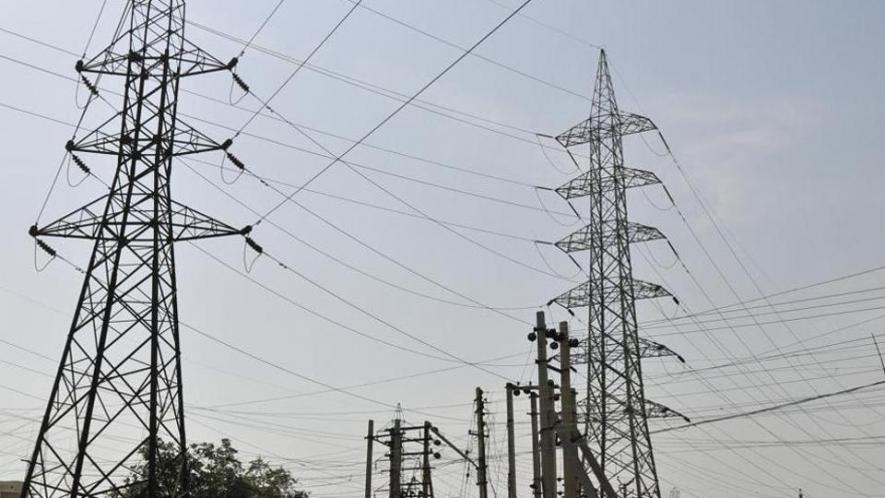
Power sector employees in Uttar Pradesh are opposing the state BJP government’s decision to hand over the Karchana power plant to the private sector.
The Karchana thermal power project, with a capacity of 1,320 megawatts, is loacted in Allahabad district, and was to be constructed and operated by state-owned Uttar Pradesh Rajya Vidyut Utpadan Nigam Limited (UPRVUNL).
However, on 1 May, the state cabinet decided that the power plant would be constructed by a private company chosen through competitive bidding, and the company would then sell the electricity back to the state.
Opposing this, the Uttar Pradesh Power Employees’ Joint Action Committee (PEJAC) — which was formed by the power-sector employees to fight against the state government’s privatisation moves — has demanded that the Yogi Adityanath-led BJP government revoke this decision.
The Committee said the power employees would be forced to begin an protest agitation if the move was not rolled back.
Shailendra Dubey, the convener of PEJAC, said that a private company would inevitably sell the electrcity to the state at higher prices, which would be passed on to the consumer, and that this move would also make way for corruption.
Moreover, the state cabinet’s decision violates the agreement signed on 5 April between PEJAC and the state’s Principal Secretary (Energy), Alok Kumar, who is also chairman of the Uttar Pradesh Power Corporation Limited (UPPCL).
In the agreement, the state government had not only agreed to withdraw the tenders it had floated in February inviting private companies to take over electricity distribution activities in seven districts, but also gave an assurance in writing that no move to privatise electricity would be made anywhere in the state.
Dubey said the agreement — which stated that no privatisation would take place without the assent of the power employees — was signed in the presence of state power minister Shrikant Sharma.
And yet, Sharma was quoted telling the media, “The state government has, therefore, decided to adhere to the Centre's policy of getting power plants constructed through competitive bidding.”
The PEJAC, in a press statement issued on 2 May, has also accused the senior officials of the power department of misleading the power minister and chief minister regarding the Karchana power plant. The Committee said that Shrikant Sharma's statement that electricity would be cheaper through the route of competetive bidding was not true, and that in the case of Karchana power plant itself it had proven to be the opposite, whereby earlier bidding had led to corruption.
The PEJAC said that the first bidding for the Karchana project had taken place in April 2008. At the time, the minimum rate cited for selling the electricity generated to the UPPCL was Rs 2.83 per unit, which the government rejected saying it was higher than the market price. The bidding happened again, and in June 2008, the minimum rate quoted was Rs 2.60 per unit, but the government again rejected this saying that it was still higher than the market rate.
But in March 2009, the tender was instead awarded to Jaiprakash Power Ventures, part of the Jaypee Group, which had quoted a minimum rate of Rs 3.5 per unit.
In this way, said PEJAC, the “drama of bidding” was staged to award the tender to a private company of the government’s choice, even though it had quoted a higher price.
The PEJAC said that the Comptroller and Auditor General (CAG) in a report regarding this scam had said that by awarding the tender at a price more than 45 paise per unit, the government had allowed the JPV to make profits more than the total cost of the plant, which was originally supposed to have a capacity of 1980 megawatts. The Committee said the state government should answer as towhat action was taken against the CAG report and why the private company was still not blacklisted.
In 2014, the Karchana power project was handed over to the UPRVUNL by the previous Samajwadi Party (SP) government after JPV had backed out in 2013. In fact, even after quoting a higher rate, the reason Jaypee Group gave for abandoning the project was that “the proposed project was unviable at the rates it had quoted to bag the project in 2009 and the total land required for the project was not handed over yet.”
The PEJAC asked what was the change in circumstances that has led the state government to again hand over the plant to the private sector. “People are wondering whether this means that there is another corruption scam in the making?” said PEJAC in its statement issued in Hindi. It said that had the project been given to the public sector from 2008 itself, it would have been completed by 2012. Now the bidding process itself would again take mora than a year, and it was hard to say when the plant would be completed.
The Committee warned the state government that if the employees began a protest movement in the state, the government alone would be responsible for the consequences because it had violated the 5 April agreement.
Get the latest reports & analysis with people's perspective on Protests, movements & deep analytical videos, discussions of the current affairs in your Telegram app. Subscribe to NewsClick's Telegram channel & get Real-Time updates on stories, as they get published on our website.










